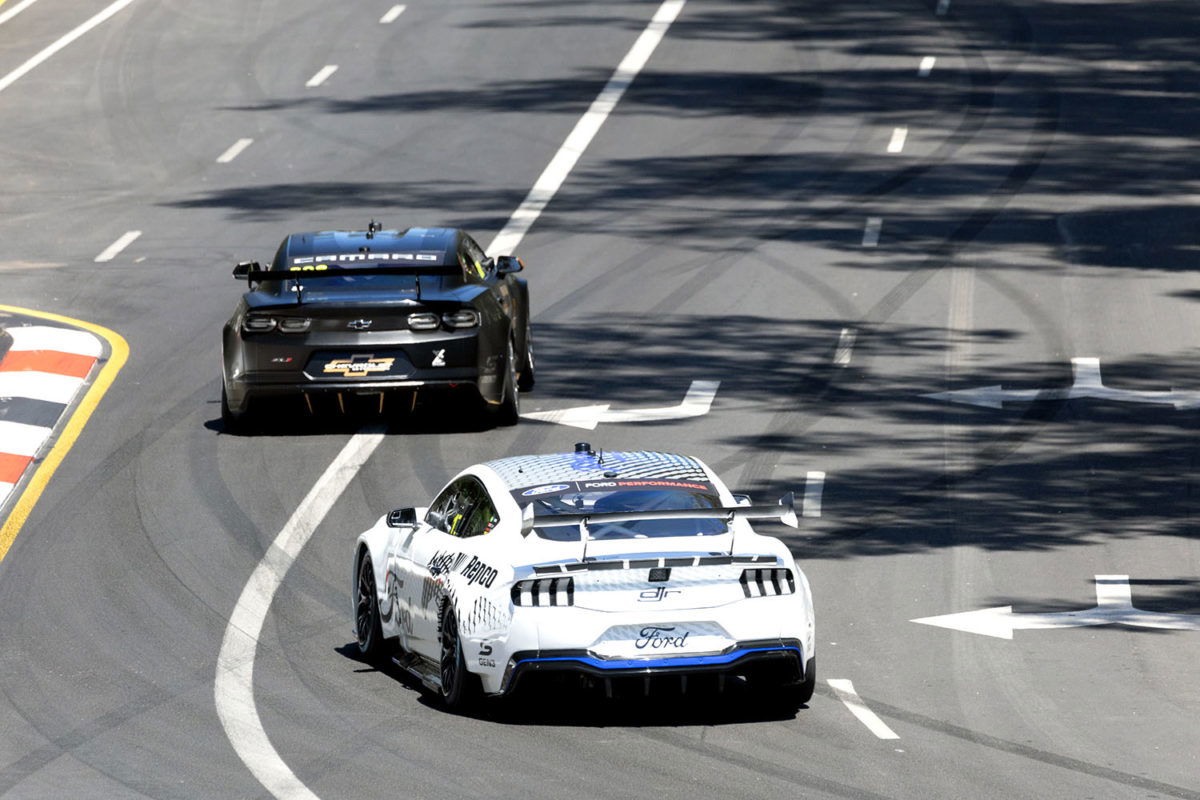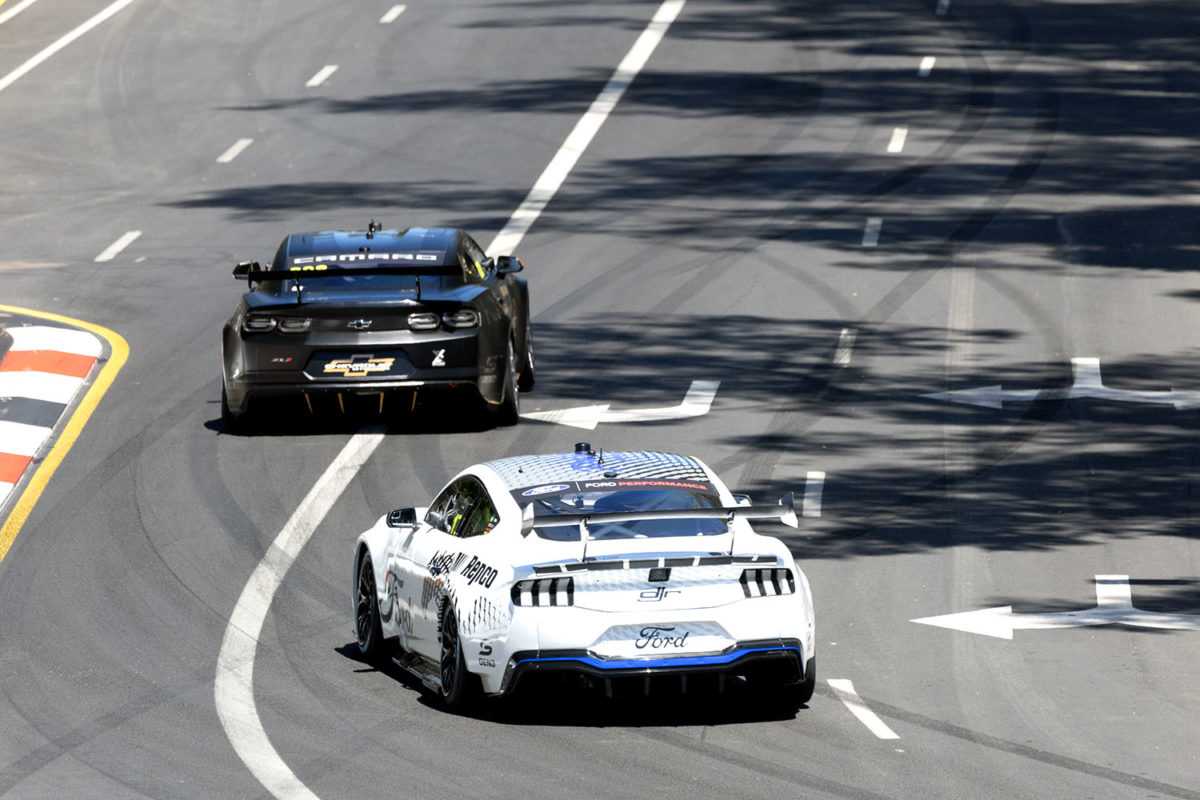

Ford remains unhappy about the parity situation in the development of the Gen3 Supercars which are set to race for the first time just next month.
The Blue Oval is understood to have had concerns about how its Mustang stacks up against the Chevrolet Camaro for months now, with both engines and aerodynamics thought to be contentious issues.
Mark Rushbrook, Global Director of Ford Performance, has spoken to that in a call with selected media, including Speedcafe.com.
“I think the industry, the media certainly has sensed or heard bits that, as a manufacturer and aligned completely with all of our racing teams, that we are not satisfied that parity has been reached either for engine or aero,” he said.
“That goes back to some of the VCAT testing that was done, and when we left there not satisfied that parity had been achieved.
“And also, more recently, with some of the testing, comparative testing that was done on track that the acceleration of the cars down the straightaway is not equivalent.
“So, certainly are some concerns there, but we’re working together in a very transparent, collaborative way, just like we do in all other racing series around the world with the series and with Triple Eight as a competitor, as the lead [Chevrolet] homologation team, to find solutions for that.
“We were in a very similar situation in NASCAR about two months before we went racing with the NextGen cars a little over a year ago, and the industry came together in a very collaborative way where Chevy and Toyota and Ford and NASCAR and all of the racing teams rolled up our sleeves, and we shared data, and we looked at it objectively as engineers, and we found solutions and made changes to the cars.
“Less than two months later, we had a start of fantastic season and introduction of that new car and great racing through the full series.
“We approach it that same way in every racing series that we go to, and it’s no different here.
“So, while there are challenges, certainly challenges in front of us, we believe the series understands the urgency that’s required, Newcastle’s not too far away, and that we’re looking forward to a solution to be able to race with parity across both brands.”
Paritising engines is nowadays a more difficult task than it had been in the three decades of both marques being powered by 5.0-litre V8s.
Going forward, Ford is using the Coyote-derived 5.4-litre double overhead cam unit whereas the Chevrolets will continue with pushrod configuration with a 5.7-litre motor under the bonnet.
Informed sources have asserted to Speedcafe.com that the engine issue is not a deficiency in the Ford unit itself, but rather how it shifts gears and/or a mapping problem, noting the claim that the engines were equal when tested on a dynamometer by Supercars’ engine specialist, Craig Hasted.
Rushbrook, however, counters that Ford has no problem in other categories, and is not lacking capability at all.
“There’s always a lot of speculation of what’s really happening or what’s not happening, so I do think it’s important that we speak not even not just within the walls, or the discussions only with Supercars and with Triple Eight, but that more be shared transparently with the media, with the fans of exactly what is going on,” he stated.
“I think everybody knew, when we started the Gen3 project, that it was going to be a challenge to balance, to have proper parity between two very different engine architectures, and I think we’re seeing some of that play out at this point in time.
“There have been points in time where if you look at our engine and some of the advanced technologies on it with what we’re able to do with that engine on the road car, we’re not able to do the same things in the race car, on the race engine; some of those knobs and controls have been turned off. That is the frustrating part, I think, for us.
“We take that same base engine, as a Coyote-based engine, and we’re able to meet the regulations and meet the parity or the balance in other racing series around the world, so there’s certainly not a lack of capability in that engine or the team that’s developing it, so I don’t have any lack of confidence or concerns with that.
“It’s a matter of their very different architectures and the process that’s being used to balance it.
“I think similar for aero; I think we showed when we brought current car that we’re racing [Gen2 Mustang], that the people from Ford Performance developing that car are very capable to develop a fantastic race car.
“We saw that on the debut of that car, and it’s the same people that worked on the development of this body.
“So again, not worried about the confidence or capability of the team that’s developed it. It’s just a matter I think of following the process and establishing that parity and being able to go race that way.”
Asked by Speedcafe.com about Ford’s position regarding if it was interested in lap time parity rather than technical parity, and what would happen if its concerns were not addressed by the time Supercars got to Newcastle, Rushbrook was blunt.
“I think we need to be, again, transparent, collaborative, work together to find solutions,” he said.
“It is hard to say that you want parity based upon lap time because you can achieve the speed in different ways, and then you can have variability as you go from track to track.
“So, I think we do need to address it at the fundamentals.
“I won’t answer the second part of that question, because our focus right now is working collaboratively to solve the issues so that we can all go racing with parity in five weeks.”
CLICK HERE for comment from Jamie Whincup on the Gen3 parity process




















Discussion about this post